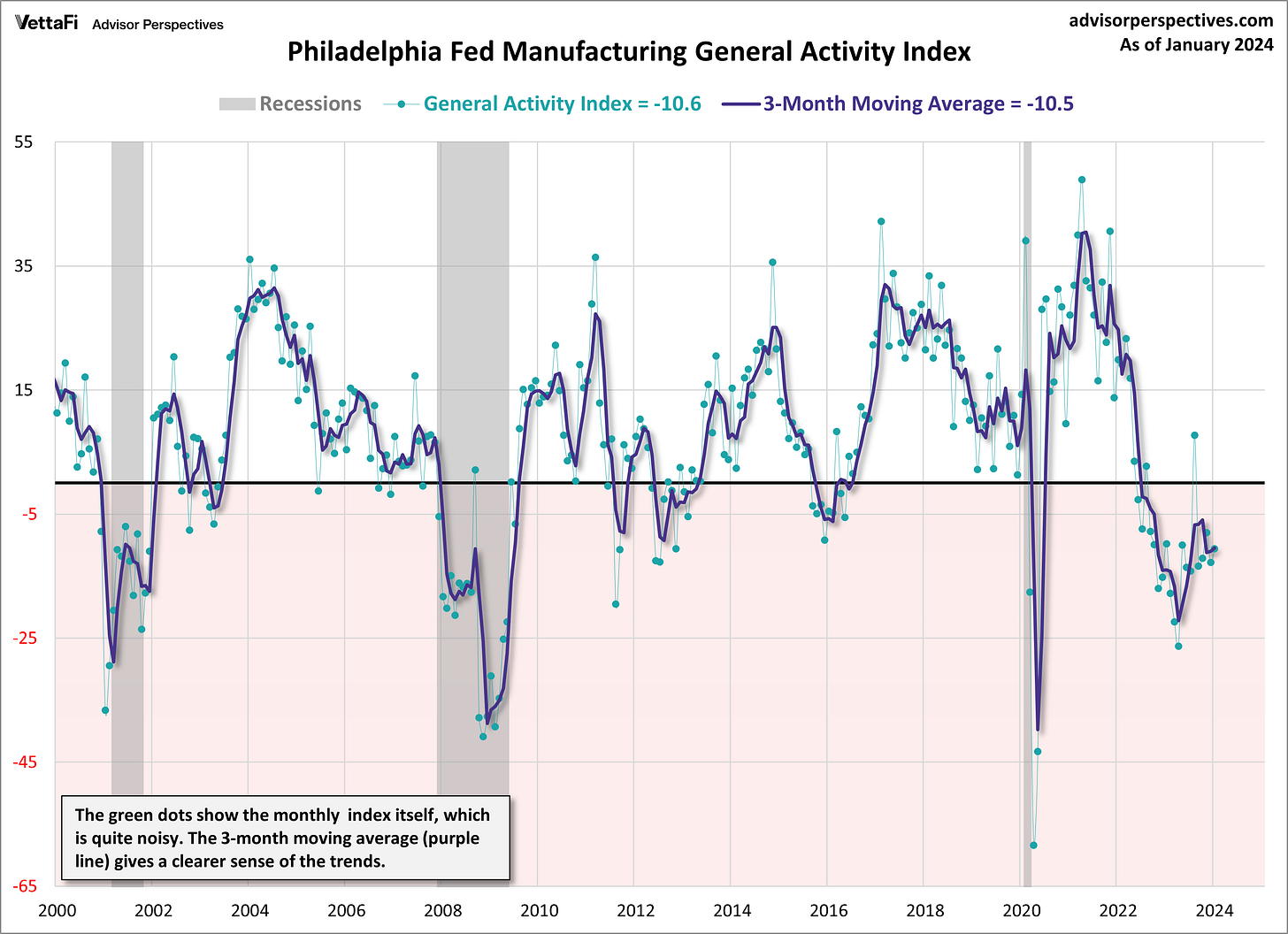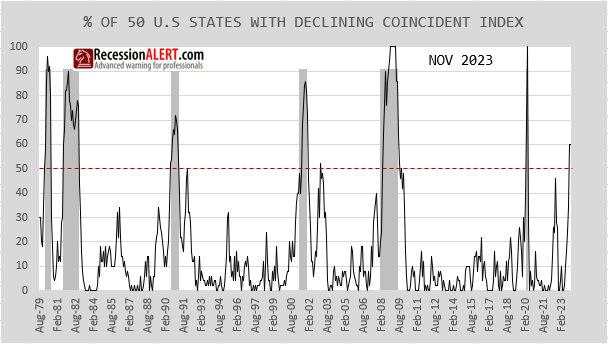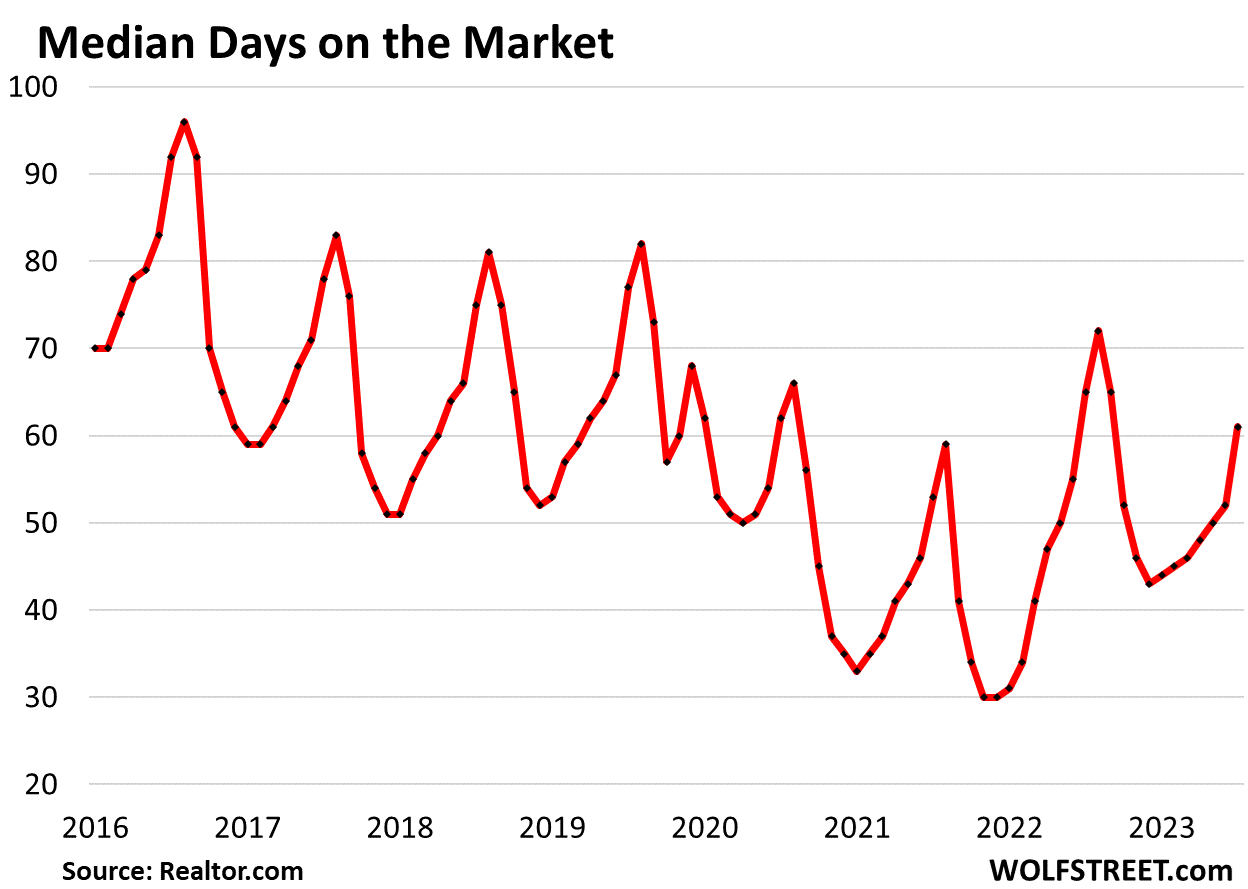“Speculators may do no harm as bubbles on a steady stream of enterprise. But the position is serious when enterprise becomes the bubble on a whirlpool of speculation. When the capital development of a country becomes a by-product of the activities of a casino, the job is likely to be ill-done.”
Love this guy.
Record Highs
Remember that Michigan Sentiment? It’s rocketing higher.
“Over the last two months, sentiment has climbed a cumulative 29%, the largest two-month increase since 1991 as a recession ended.”
Philly Fed Manufacturing Index, not so much.
A couple comments I saw that echo a sentiment I hear often:
Do you think many “sloppy loans” were made in the past few years? Just a thought.
The Federal Reserve Bank of Philadelphia produces a monthly coincident index for each of the 50 U.S states.
The coincident indexes combine 4 state-level indicators to summarize current economic conditions in a single statistic :
(1.) non-farm payroll employment
(2.) average hours worked in manufacturing by production workers
(3.) the unemployment rate
(4.) wage & salary disbursements deflated by the consumer price index (U.S. city average).The trend for each state’s index is set to the trend of its gross domestic product (GDP), so long-term growth in the state’s coincident index matches long-term growth in its GDP. Here is a chart showing the percentage of the 50 U.S states with a declining coincident economic index.
We often hear “What is the bond market telling us?
Maybe when we get back to these levels we’ll know. (I know - we’re never heading back to those levels.)
Can we talk about Florida?
Florida is constantly talked about as one of the hottest real estate markets in the US (no pun intended). The median home price in FL increased from $329k in April 2020 to $460k in December of 2023, a 40% increase in 3.5 years. During that same period, real median household income has been stagnant, hovering around $65k. The topics of wage stagnation, pandemic urban flight, declining remote work, and interest rates are already talked about here frequently and aren't specific to Florida. So let's get into the FL details instead…
‘Corporate towns: Much needed housing supply or dystopian nightmare?’
Google-parent Alphabet Inc. is in the process of building a massive 153-acre neighborhood near its Mountain View, California, headquarters. The complex will feature more than 7,000 homes and roughly 300,000 square feet of retail and community spaces.
Meanwhile, Facebook owner Meta was recently approved for a 59-acre housing project dubbed “Zucktown.” It will feature 1,700 residential units, a hotel, offices, and retail space not far from Meta’s headquarters.
Amazon is taking a slightly different approach after selecting Arlington, Virginia, as the site of its new second headquarters, where 250,000 workers will congregate. Rather than build homes directly, the e-commerce giant has set up a $2 billion Amazon Housing Equity Fund, which will support housing development in the surrounding regions, as well as other states.
Then there's billionaire entrepreneur Elon Musk, who has reportedly acquired thousands of acres near Austin, Texas, to house employees of Tesla, SpaceX, and Boring Co.
Housing Starts
Wolf Richter does a good job keeping tabs on U.S. housing
Ireland
House prices predicted to rise further in 2024 with strongest growth outside Dublin (via Bernard)
THIS YEAR WILL see house prices continue to rise, estate agency business DNG has forecast. Its National Price Gauge found that the average price of a second-hand home in Dublin stood at €531,773 in 2023 ($578k), up 1.8% on the year previous but still below the 2006 peak. Nationally, excluding Dublin, the average price stood at €264,772 ($288k), up 4.3%.
So I looked it up, and in 2022 (latest available) Irish ‘nominal disposable household income’ was around €47,000. The average used home price in Ireland therefore is about 5.6x household income (and far more in Dublin).
Yesterday, the latest Daft.ie House Price Report found that the number of homes available to buy nationwide on 1 December 2023 stood at just over 11,100 and also noted a continued increase in house prices. It comes amid a backdrop of a record-breaking number of people homeless. The latest available figures found that 13,179 people were accessing emergency accommodation in October, including a record number of children.
If you’ve never seen this from 2010, it’s one of the best short interviews ever. I can relate to this guy. (Language warning)
Why Most Foreclosure Auctions Don't Actually Result In Sales
A lot of “extend and pretend” going on in CRE.
“…when the time came to bid on the 640K SF property, the crowd was silent. No one bid and the property remained with its lender…It’s a scene playing out on courthouse steps and under awnings of municipal and county buildings in greater numbers across the country. With commercial real estate loan distress at a 10-year high, foreclosure auctions like these are growing increasingly common…
Another reason not to bid is the same sticky wicket holding up many kinds of transactions these days: The prices are too high.
…“At this point, there's been a lot of room and willingness on the part of lenders to do workouts, forbearance agreements and work with the borrowers, rather than take over, especially with office buildings. I don’t know that lenders really want to take ownership in the current market”…“I think at some point, patience will start wearing thin and people will have to start moving forward with taking control of properties”
I feel now a lot like I did in the mid-2000’s. This is a aircraft carrier turning, not a Boston Whaler.
Speaking of aircraft carriers, here’s a recent Rabobank report: Same Deep Ship, Different Day
TL;DR
“The Red Sea crisis reducing cargo transit via the Suez Canal is in line with our projections of a more ‘geopolitical’ world economy making it harder to keep inflation low”
“Financial markets still focusing on “transitory” fail to see this looming impact”
“Things aren’t as bad as the last shipping crisis but could still get painful if Suez is not resolved soon, and if we see probable second- and third-order effects”
“Worryingly, it’s hard to see how this crisis can be truly resolved when it’s so well anchored”
In particular focus here, total container transits and tonnage via the Suez Canal have slumped to Covid-era lows (Figures 3 and 4). Are markets right to still be sanguine about inflation when 30% of global container traffic has to go round the Cape of Good Hope rather than through the Suez Canal, adding at least 10-14 days to journey times?
…The US and UK have therefore also launched separate (well-sign posted) air and missile strikes on the Houthis. However, these are unlikely to have a long-term deterrent effect given the needle-in haystack of mobile targets and fresh resupply: indeed, the Houthis, Hezbollah, and Iran have all pledged to step up attacks on global shipping in response, and the Houthis subsequently fired a missile at a US warship (which was shot down). Meanwhile, the US-UK attacks reportedly used more than a year's worth of the Navy’s share of Tomahawk missile production, pointing to the weak supply side of the US military-industrial complex
On a side note, the U.S. has been bombing - previously indirectly, through our 9/11-adjacent ‘allies,’ the Saudis - the Houthis for around eight years.
Here’s Wolf Blitzer and Rand Paul in 2016. Check out Blitzer’s depraved logic: killing random people as a jobs project.
The Great Taking
Several people have asked me about The Great Taking, a book by David Rogers Webb, which can be downloaded here (among other places.)
Webb also has a documentary, which I listened to on a walk:
I love a good conspiracy as much as the next guy, but I am not convinced on this one.
There is good reason to be concerned regarding the topic of “confiscation”, I agree. For example, our deposits at banks make us unsecured creditors - we do have FDIC insurance up to $250k for individuals, but beyond that, theoretically, get in line. (I do believe that they WILL honor FDIC insurance. They have a printing press after all.)
It is true that the billionaire depositors at SVB were made whole - it helped that they were billionaires - but the U.S. has not explicitly promised to backstop deposits over FDIC-insured amounts for run of the mill serfs like you. Bill Ackman, sure, but we’d take a haircut.
Janet Yellen makes it quite clear - only some are too big to fail. Nothing has changed since 2008 except the systemic risks are now massively larger.
I never cease to be underwhelmed by this woman.
Bail-In!
If you remember Cyprus, 2013: Cyprus, lenders set Bank of Cyprus bail-in at 47.5 pct, sources say
“Cyprus and its international lenders have agreed to convert 47.5 percent of deposits exceeding 100,000 euros in Bank of Cyprus to equity to recapitalize it”
Cyprus was a great example of what could happen in the worst case to uninsured U.S. bank depositors (like I said, I think the FDIC and the Fed would cover insured deposits. Maybe I’m naive.)
Hopefully y’all also remember John Corzine and former primary-dealer MF Global, where the problem seemed to be more run of the mill, ordinary theft.
(As an aside, before the GFC (Great Depression II) hit, I moved my brokerage margin accounts to cash accounts, because I believe cash accounts are at less risk of any rehypothecation weirdness. Do your own research.)
Getting back to The Great Taking, I just don’t think Webb makes a convincing case. I can’t prove it’s not going to happen, but it’s low on my list of worries.
Martin Armstrong notes:
To suggest that the government is going to take everything you own is just not true. That would be REVOLUTION time, and the government would collapse instantly, for not even the army would support them. You MUST understand the difference between an UNSECURED and a SECURED creditor. Equating this to the taking of gold is not the same situation. Your money in the bank at the time was expressed in dollars – not ounces of gold. The Supreme Court held that changing the backing of the dollars did not change the dollar you had or owed.
The governments will NOT seize the ownership of everything. They rely on the military for power. Just as in Russia, when Yeltsin stood on the tank and pleaded with the military not to kill their fellow Russians, once they stood down, the coup collapsed. In China, the military obeyed, but to a limited degree, forcing the government to change direction in 1989. The government could NEVER seize everything without the military backing them up.
I tend to agree. They have a printing press…
William Schryver has been writing thoughtfully on the Ukraine/Russia conflict - from a very non-narrative viewpoint - and today he makes a point I’ve also thought about a lot:
The US military has not won a war since WW2. They have mercilessly bombed the crap out of many smaller, weaker countries, killed millions of people, and yet never once achieved strategic victory.
Food for thought.
Dr. Fauci claimed that the “6 feet apart” social distancing recommendation promoted by federal health officials was likely not based on any data. He characterized the development of the guidance by stating “it sort of just appeared.”
























New (paid) subscriber: Very informative collection of data points. Memes make it fun too. Thank you!
I learned a new financial term today: Irish Wanking Bankers. Perfect description. Maybe you could work with Prof Dave to develop a Wanking Banker's Index to go with your excellent assortment of charts?